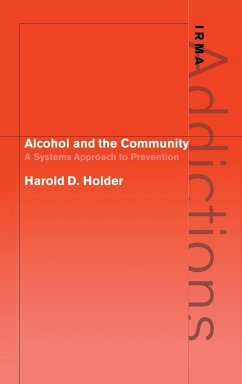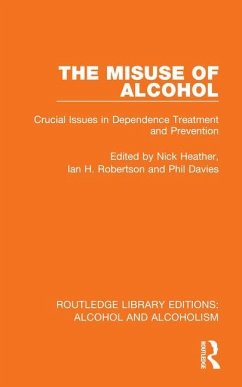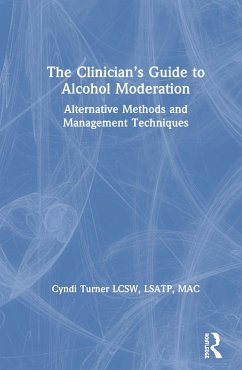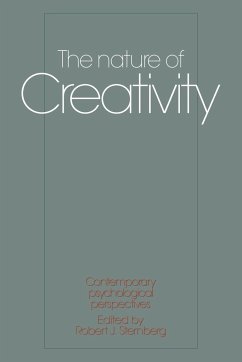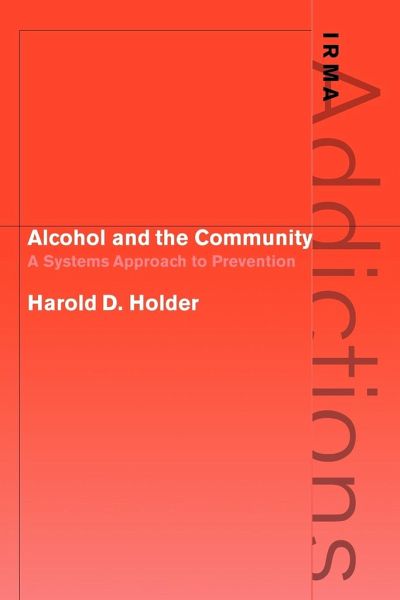
Alcohol and the Community
A Systems Approach to Prevention

PAYBACK Punkte
28 °P sammeln!
Offers an ecological perspective of the community as an alternative approach to the prevention of alcohol-related problems.An individual's decision to use alcohol and the frequency, quantity and situation of such use are the result of a combination of biological and social factors. Drinking is not only a personal choice, but also a matter of custom and social behaviour, and is influenced by access and economic factors including levels of disposable income and cost of alcoholic beverages. Until prevention efforts cease to focus narrowly on the individual and begin to adopt broader community per...
Offers an ecological perspective of the community as an alternative approach to the prevention of alcohol-related problems.
An individual's decision to use alcohol and the frequency, quantity and situation of such use are the result of a combination of biological and social factors. Drinking is not only a personal choice, but also a matter of custom and social behaviour, and is influenced by access and economic factors including levels of disposable income and cost of alcoholic beverages. Until prevention efforts cease to focus narrowly on the individual and begin to adopt broader community perspectives on alcohol problems and strategies to reduce them, these efforts will fail. The author challenges the current implicit models used in alcohol problem prevention and demonstrates an ecological perspective of the community as a complex adaptive system composed of interacting subsystems, an appreciation and understanding of which offers an alternative approach to the prevention of alcohol dependence and alcohol-related problems.
Review quote:
'Anyone with an interest in alcohol policy of prevention will be enriched by reading this monograph. Libraries should look out for the IRMA series.' Addiction Biology
Table of contents:
Series editor's preface; Acknowledgements; 1. The community system of alcohol use and alcohol problems; 2. Consumption system; 3. Retail sales subsystem: alcohol availability and promotion; 4. Formal regulation and control subsystem: rules, administration and enforcement; 5. Social norms subsystem: community values and social influences that affect drinking; 6. Legal sanctions subsystem: prohibited uses of alcohol; 7. Social, economic and health consequences subsystem: community identification of and responses to alcohol problems; 8. Community-level alcohol problem prevention; References; Index.
An individual's decision to use alcohol and the frequency, quantity and situation of such use are the result of a combination of biological and social factors. Drinking is not only a personal choice, but also a matter of custom and social behaviour, and is influenced by access and economic factors including levels of disposable income and cost of alcoholic beverages. Until prevention efforts cease to focus narrowly on the individual and begin to adopt broader community perspectives on alcohol problems and strategies to reduce them, these efforts will fail. The author challenges the current implicit models used in alcohol problem prevention and demonstrates an ecological perspective of the community as a complex adaptive system composed of interacting subsystems, an appreciation and understanding of which offers an alternative approach to the prevention of alcohol dependence and alcohol-related problems.
Review quote:
'Anyone with an interest in alcohol policy of prevention will be enriched by reading this monograph. Libraries should look out for the IRMA series.' Addiction Biology
Table of contents:
Series editor's preface; Acknowledgements; 1. The community system of alcohol use and alcohol problems; 2. Consumption system; 3. Retail sales subsystem: alcohol availability and promotion; 4. Formal regulation and control subsystem: rules, administration and enforcement; 5. Social norms subsystem: community values and social influences that affect drinking; 6. Legal sanctions subsystem: prohibited uses of alcohol; 7. Social, economic and health consequences subsystem: community identification of and responses to alcohol problems; 8. Community-level alcohol problem prevention; References; Index.





